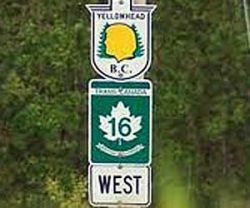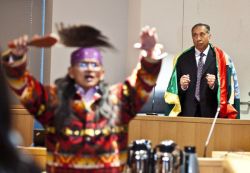Regional Human Rights reps to visit BC, focus on Missing and Murdered Indigenous Women
BLOG POST posted on July 28, 2013 by Kerry Coast

Highway 16 in northern BC is the place of many disappearances. After the Missing Women Commission of Inquiry, one of Justice Wally Oppal's recommendations to the government is to increase public transportation on this route.

Commissioner Wally Oppal, at back, was charged with finding out why Vancouver police and the RCMP took so long to respond to signs of a serial killer in the Downtown Eastside. Most of the victims were aboriginal women, but Oppal could find no connection between the police inactions and the preponderence of evidence of racism against aboriginal people in the police Department.
Following a self-serving treatment of the Pickton Inquiry, police and government are the subject of a growing international call for a federal Commission into the prevalence of violence against Indigenous women and girls.
Tracy Robinson, Special Rapporteur on the Rights of Women and Dinah Shelton, Special Rapporteur on the Rights of Indigenous Peoples of the Inter-American Commission on Human Rights (IACHR), will be visiting Canada between August 6 and 9, 2013. The Commissioners are conducting this visit to analyze the situation of missing and murdered aboriginal women in British Columbia.
The visit of the IACHR was not publicized and the dates announced just last week. It is a sign that Canada and BC are in extremely deep water with the international community.
Indigenous families of missing and murdered women began to raise the issue of police inaction and so many uninvestigated murders and disappearances in the 1990’s – probably when they began to realize how many of themselves there were. A disproportionately high number of victims of violent crimes in Canada are Indigenous women, and the perpetrators of the worst of those crimes are white men. Although other countries have been using international human rights mechanisms to pressure Canada to address this, neither the state, the non-native community at large, the police or even national human rights commissions are taking the recommended action.
The focus on British Columbia follows a provincial Inquiry which perhaps demonstrated to the IACHR and the international community that these governments will continue to loudly ignore Indigenous people.
The Missing Women Commission of Inquiry took place in Vancouver during 2011 and 2012. It was led by Justice Wally Oppal, who actually is very interested in police affairs. Oppal was Commissioner of an Inquiry into police conduct in the 1990’s, and during this latest Commission he showed continued interest in police policy and procedure, organization and cost-efficiency.
He did not, however, show an appropriate level of concern for the seriousness of this Inquiry for Indigenous people. The Oppal Commission steered a wide path around the fact that most of Robert Pickton’s victims were aboriginal. Given that the question under study was, “why did it take the Vancouver Police Department (VPD) and the RCMP (Royal Canadian Mounted Police) so long to act on the evidence of a serial killer,” the general culture of racism in the Departments should reasonably have been included as a possible or even probable factor.
Oppal did not allow for reasonable consideration and appropriate testimony going to the question of whether racism among BC police, VPD and RCMP, contributed to formal indifference to the disappearance of so many women from the same area of town. Instead, he wrote in his report, “My Terms of Reference did not extend to a full consideration of whether sexism or racism was pervasive within the cultures of the VPD or the RCMP.”
The suggestion was raised, in evidence, that the VPD officers in charge of taking reports of missing persons were so racist, rude and ineffective that many cases were not reported nor pursued. The Commissioner responded to this in his report with a section called “4.f. Police Culture and ‘People Problems.’”
Jason Gratl, independent counsel at the Commission, wrote in his final report the details of how VPD and RCMP procedure discriminated against aboriginal people and how many times recommendations to change those practices were ignored. He chose to cite some of the “people problems” within the VPD, like when Cstl. Sandy Cameron left a message at the Native Liaison Society office: “Tell Morris I found one of his whores.” Gratl thought it illuminating to recall the following incident as well: after two years and eight family members contacting the Native Liason about a disappearance, finally the officer said to the daughter of the missing woman: “Well, you might as well prepare yourself, Donalee, because nobody wants to look for a 40-year-old native woman. They’re not interested in looking for her.” (See Jason Gratl, "Wouldn't Piss On Them If They Were on Fire: How Discrimination Against Sex Workers, Drug Users and Aboriginal Women Enabled a Serial Killer”)
Oppal could find no important link between systemic racism and the tragic events which transpired over decades on Skid Row, but that “if they were present, these internal dynamics likely had a detrimental impact on police actions, omissions and interactions with marginalized members of our communities.”
Shortly after Oppal released his report, an organization called Human Rights Watch released the results of its findings with aboriginal women in northern British Columbia.
Meghan Rhoad and two other researchers interviewed 50 aboriginal women and girls. Rhoad reported to media that they found the fear of police among aboriginal women "comparable to post-conflict situations, like post-war Iraq."
The Human Rights Watch report includes descriptions of physical and sexual abuse. A homeless aboriginal woman told how police took her outside of town and raped her, and then they "threatened that if I told anybody they would take me out to the mountains and kill me and make it look like an accident." All testimonials were released anonymously, and names of alleged perpetrators have also been kept out of the report.
Human Rights Watch has called on Canada to conduct a public inquiry, which could be part of a national commission of inquiry or a standalone inquiry.
They are hardly alone in this demand.
The draft report of the working group on the Universal Periodic Review of Canada, April-May 2013, includes 162 recommendations for Canada from UN member states. Nearly two thirds of those recommendations pertain to respecting the rights of Indigenous Peoples, and most of those recommendations mention the need to prevent further violence against aboriginal women and girls.
The more Canada tries to bury this issue, like they did in 2010 when they refused the Native Women’s Association of Canada funding which might be used for the Sisters in Spirit campaign, the more other nations become interested in revealing it. Sisters in Spirit, a series of vigils across Canada, raised the issue of missing and murdered Aboriginal women among non-natives and around the world. It conducted research into 582 cases and compiled evidence which is being used to date; its national database became the first of its kind in Canada.
Presently the European Union is considering a trade deal with Canada, and activists there are reacting in strong opposition, pointing back at these ongoing human rights abuses. At the meeting of the Expert Mechanism on the Rights of Indigenous Peoples, in July, a joint statement by several European groups was delivered. It said in part:
The discrimination and indifference towards Indigenous women by authorities results in impunity for the perpetrators of so many violent crimes committed against them. This culture of impunity contributes to the ongoing violence against Indigenous women and girls in Canada, a fact that almost two thirds of comments about Canada during its most recent UPR remarked on.
Indigenous Women are five times more likely than other women of the same age to die as a result of violence. Nonetheless, Indigenous women don't have adequate access to justice, as the case of the serial killer Robert Pickton in British Columbia demonstrated. The BC Missing Women Commission of Inquiry, which was created to investigate the failures by the police in this case, denied full participation to affected families, Indigenous and human rights organizations. We also recall the case of Judge David Ramsey who was sentenced to jail in 2004 for sexual assault causing bodily harm, breach of trust and three counts of buying sex from a person under 18. His victims, mostly aboriginal girls living in poverty and in trouble with the law, were subjected to acts of escalating sexual violence. Some were as young as l2 years old.
The situation of injustice and further violence for Indigenous women in Canada was noted in many statements by Indigenous Peoples’ Organizations and women’s organizations at the UN Permanent Forum on Indigenous Issues in May. Many of them called for a national inquiry and recommended Canada be the subject of the next UN Committee study on violence against Indigenous women and girls.
Police brutality against Indigenous people generally was the subject of a protest in Vancouver just last week. http://vancouver.mediacoop.ca/photo/standing-united-against-police-abuse/18375
To contribute to the IACHR visit or to submit information to the Special Rapporteurs, contact their offices in the Organization of American States. The Special Rapporteurs are mandated to receive complaints and information from individuals, organizations and peoples.
The site for the Vancouver local of The Media Co-op has been archived and will no longer be updated. Please visit the main Media Co-op website to learn more about the organization.
Comments
Such a serious issue! The
Such a serious issue! The government must act on this as soon as possible. For indigenous people are also humans, and so they also have human rights. They must put checkpoints on this specific area, and in accordance to the author's point of view, might as well increase public transportation on this route to help lessen the crimes.
summer party cebu